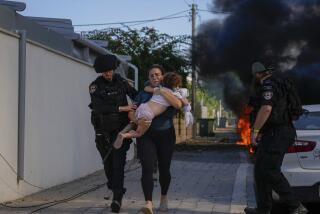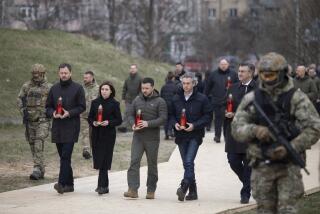Serbian Authorities Thwart U.N. War Crimes Investigation in Balkans : Atrocities: Gathering evidence is nearly impossible because some of the suspects are among those holding onto power.
- Share via
OVCARA, Croatia — Behind a pig farm, at the end of a country road recently upgraded from mud to gravel, Russian soldiers stand a round-the-clock guard over the scene of an alleged war crime that investigators doubt will ever come to trial.
The swampy site, deep in Serb-held territory in this eastern Croatian village, is believed to be a mass grave holding the decomposed remains of more than 200 patients from Vukovar hospital who disappeared when the city fell to Serbian gunmen two years ago.
Investigators gathering evidence for a U.N. war crimes tribunal, which held its inaugural meeting in The Hague last week, have been trying since March to excavate the site. They have been thwarted repeatedly by Serbian authorities who have no interest in dredging up material that might be used against them.
The array of earth-movers, X-ray equipment and forensics experts summoned to Ovcara for nothing is a scene played out across the war-torn Balkans. And unlike the last time the international community sought to prosecute the perpetrators of atrocity, nearly half a century ago at Nuremberg, most of those accused of crimes against humanity in the Balkans are among the victors instead of the vanquished.
“It’s hard to believe they would ever be enthusiastic to be helpful,” the chief inspector for a U.N. commission of experts probing alleged war crimes, Canadian lawyer William Fenrick, said of the Serbian military authorities who run this region. “This is not going to be Nuremberg II, where it was pretty clear who won and who lost.”
War crimes investigators and human rights envoys probing reports of 98 mass graves, nearly 400 detention camps, alleged centers of sexual slavery and organized terror against civilians often find themselves at the mercy of the very forces who are under suspicion.
After more than two years of losing evidence to physical decay and deliberate tampering, the United Nations is now trying to preserve suspected crime scenes.
Some of the 25,000 U.N. troops deployed in the Balkans have been called upon in recent months to aid in the pursuit of justice.
In September, for example, U.N. soldiers and police were able to examine the bodies of executed civilians and photograph the “scorched earth” remains of villages in the Medak pocket of southwestern Croatia after a rampage by Croatian forces.
But gathering evidence in regions such as Vukovar and in the ruins of eastern Bosnia-Herzegovina, where the worst of the war crimes are alleged to have been committed more than a year ago, is proving nearly impossible.
In the case of Ovcara, the commission was forced to bow to the occupying Serbian regime.
“Presuming we wanted to avoid any sort of violence, we had to have their blessing,” Fenrick said of the Serbs, who seized one-third of Croatia in 1991 and have since declared the stretch of vanquished territory to be the independent Republic of Serbian Krajina.
Much of the delay in exhuming the evidence at Ovcara was because of bureaucracy and poor funding by the U.N. Security Council, which appointed the five-member commission of experts in October, 1992.
One commission chairman resigned in September, citing health concerns and frustration over lukewarm U.N. support, and his successor died less than a month later.
It then took five trips to the Krajina capital of Knin by Fenrick and the new chairman, De Paul University professor Cherif Bassiouni, to exact an agreement from the region’s purported prime minister, Djordje Bjegovic, to allow a 60-member Dutch engineering team to begin examining Ovcara.
But when the first major investigation into a serious war-crime allegation was to begin on Nov. 2, local Serbian gunmen from nearby Vukovar blocked access to the site.
Branko Filipovic, a Krajina official based in the Serbian capital of Belgrade, claimed that the deal Bassiouni cut with Krajina involved several conditions.
In a letter to the commission a few days after the faceoff, the man claiming to be Krajina’s foreign minister, another Belgrade-based Serb named Slobodan Jarcevic, demanded that the forensics team simultaneously exhume the bodies of 2,500 Serbs in the village of Pakracka Poljana, which Belgrade authorities claim was the site of a massacre in November, 1991.
Fenrick said in an interview that his team had been quietly excavating the site claimed to be a mass grave for Serbs. He said the remains of 19 people had been found, but that there was no reliable means of determining their nationalities or identities.
The Ovcara site, by contrast, was located through testimony by dozens of surviving witnesses who were able to provide full lists of the missing Vukovar hospital patients, dental records and other materials that can be used in post-mortem identification, Fenrick said.
An American forensics expert last year made an initial examination of the site and confirmed it contains a large number of bodies.
Filipovic insisted that the U.N. team had deliberately excavated the wrong site at Pakracka Poljana, and the Belgrade faction of the Krajina leadership he is allied with has declared that no work at Ovcara will be permitted until the remains of the 2,500 allegedly executed Serbs are found.
“The whole notion that you let the potential defendants decide the terms of your investigation is ludicrous, but it serves well as an illustration of the wider role of the war crimes process, which is to create the illusion of justice being done,” said one angry Belgrade-based diplomat, who described the tribunal as a farce. “That none of this will ever lead to serious prosecutions is a foregone conclusion.”
Bassiouni said after the last abortive attempt to get the probe under way that he would continue pressing Knin authorities to make good on their pledge to assist the commission.
But Fenrick conceded that the U.N. team was probably being treated to a good-cop, bad-cop routine, in which the figureheads in Knin promised cooperation while Serbian guerrillas, who rule this part of eastern Croatia, have made clear there will be no exhumation.
While the excavation of Ovcara to gather evidence in one of the most publicized war crimes cases has been indefinitely postponed, some work has been accomplished in preparation for other possible trials.
After the June 1 shelling of a Sarajevo suburb in which 15 people were killed while playing a pickup game of soccer, the U.N. team analyzed the craters left by the exploding shells to determine that they were fired from Serbian positions above the city.
Testimony is also being gathered from thousands of rape victims to determine if their assaults reflect a pattern that would substantiate claims that top Serbian commanders ordered the attacks.
Fenrick, the only full-time member of the investigative commission, said it would be impossible for his understaffed and poorly funded team to put together compelling cases against individuals for specific crimes.
But he said patterns can be established to show that senior officials knew or should have known that crimes were being committed by their forces.
“If you take Sarajevo, it is pretty clear what is going on there,” Fenrick said of the artillery noose Serbs have erected on the high ground surrounding the capital, where at least 10,000 civilians have been killed during 19 months of shelling. “If you ask if I can prove that Colonel So-and-So killed a specific person, there’s no hope. But we can say that during General So-and-So’s time in charge, this number of civilians were killed and apparently not by accident.”
But as long as the most prominent targets, such as Bosnian Serb leader Radovan Karadzic and his nationalist military chief, Gen. Ratko Mladic, remain in power, there will be no means of calling them before the tribunal. The 11-judge panel has no authority to try suspects in absentia, and the victorious forces are unlikely to extradite their own leaders.
More to Read
Sign up for Essential California
The most important California stories and recommendations in your inbox every morning.
You may occasionally receive promotional content from the Los Angeles Times.











